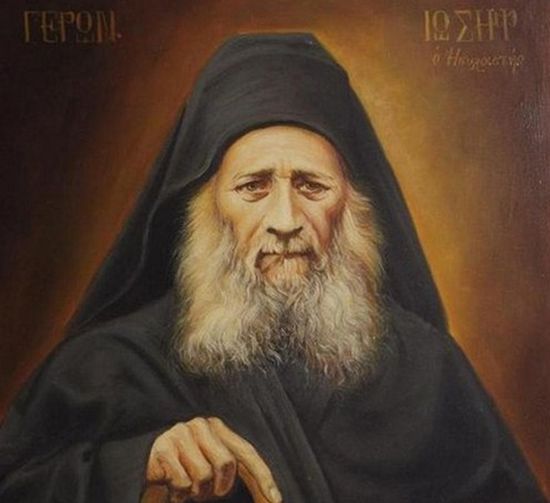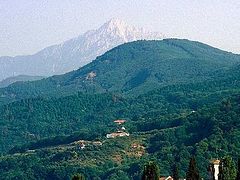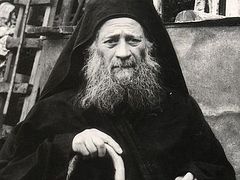As explained in Part 1 of these articles, the following stories were included in the published editions of Elder Ephraim’s biography of St. Joseph only in English and Russian.
His Simple Mother
The mother of Francis [i.e., Elder Joseph] was a simple person. One day when he was older, he took her to a movie theatre to show her a motion picture for the first time in her life. When the movie depicted a burning room, she thought it was real and starting shouting, “Fire! Fire!”
A Lion’s Heart
Francis’s one human flaw as a young man was that he would easily get angry. Later he wrote about his younger years: “When I was in the world, I could take on thousands. I had a lion’s heart.” And these words were no exaggeration. For example, once when he had his wares set out for sale, he told his brother Nicholas: “Listen. I’m going downtown to buy some things. Make sure no one steals anything while I’m gone.”
“Go ahead, Francis. I’ll be here.”
When Francis returned, he immediately noticed that some things were missing.
“Hey, what happened?” he asked his brother. “Some scarves are missing!”
His clueless younger brother was busy playing his violin and hadn’t noticed. But Francis was very sharp and he was counting on selling those items to support their large family.
He asked Nicholas angrily, “Who passed by here?”
“Oh, just some Russian fugitives. They looked around and left without getting anything.”
“You idiot! They stole twelve scarves! You’re blind! Where did they go?”
“That way.”
Francis ran off and found some Russians dividing the spoils amongst themselves. Without delay, he leaped into the middle of their gang. There were seven of them and only one of him, but he was like a lion! He managed to fight them all off, grab the scarves, and return victorious. “Here they are!” he shouted triumphantly to his brother.
One should not be shocked to see that Elder Joseph had this flaw when he was young. On the contrary, we should be encouraged to see that even today it is possible to overcome our passions and reach sanctity as did Elder Joseph. Perhaps it was divine providence that allowed him to have such a fiery character in the world so that he could use this force for God. When he became a monk, he said to himself: “The way I was a fighter in the world is how I will now be with the demons.” Indeed, as we shall see, he did use his strong temperament to struggle fiercely in the arena of monasticism against the passions and the demons.
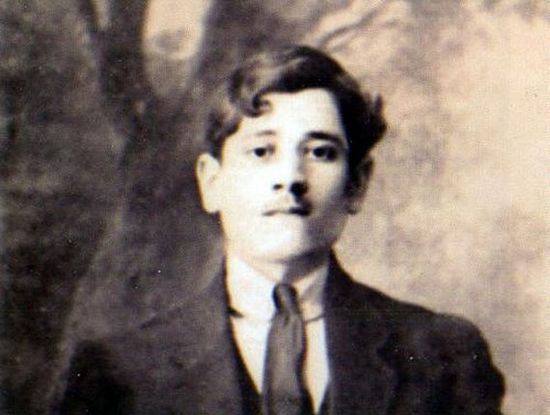 The future Geronda Joseph in his youth. Athens, 1920s. Photo: theodromia.blogspot.com
The future Geronda Joseph in his youth. Athens, 1920s. Photo: theodromia.blogspot.com
Christ Appears to Francis
One day Francis had great difficulty selling his wares. That evening in his prayers, he complained to God and said, “Don’t You feel sorry for me?”
In his sleep, he saw someone with a supernatural appearance, who asked him, “Who am I, Francis?”
“I don’t know, sir.”
“How can you not recognize Me, since your heart is constantly meditating on Me with warmth? I am the Savior of the world. From now on, I don’t want you to be here doing business with earthly and temporal things but to be doing business with souls. You shall go to the barracks from which no one leaves unless I want him to.”5
After these visions Francis felt a kind of melancholic listlessness and an aversion towards worldly things. When his landlord’s daughters saw his downcast appearance they asked him what was wrong, and in order to help him they lent him the New Collection. This was a collection of lives of the saints written by St. Nicodemus of the Holy Mountain. Francis was astonished when he read it. He could not believe that such people existed—people who struggled so intensely for God in their lives and who with God’s help performed miracles!
Journey to the Holy Land
When people met Anastasios [i.e., Fr. Arsenios] on his way to Jerusalem, they asked him: “Where are you going?”
“To the Holy Land,” he replied.
With great surprise they asked, “But which road are you going to take?”
“It doesn’t matter; all roads lead to Jerusalem!” he responded with his typical simplicity.
Even after he left home, his mother still prayed intensely for his salvation. She told his little sister, “Let’s go out to our garden.” When they got there, she said to her: “I didn’t want to come out to the garden to check on it but to pray for your brother.”
“Why? He went to become a monk.”
“Yes, he has gone to become a monk, but has he secured his salvation? He’s still just a youngster. Who knows what kind of people are down there. That is why I beseech Christ and the Panagia day and night to help him.”
What a diligent mother! It was her prayers and tears that helped him and protected him from evil. After all, he was so simple that he would do whatever people told him.
Simplicity
When Fr. Anatolios [i.e., Fr. Arsenios] arrived at the train station in Alexandria, the porters saw his silken cassock and assumed he was rich, so they cordially offered to carry his baggage for him. Seeing such kindness, Fr. Anatolios said to himself with amazement: “Just look at what good Christians these people are! Not even we monks are so helpful!”
As soon as they had arrived to where they were going, the porters said to him: “Hand it over.”
“Hand what over?”
“The money!”
“You mean you take money for carrying my things?”
“Hmph! What do you think? We’d do it for free?”
“You mean you don’t do it out of love for Christ?”
“No, Father. How else are we going to make a living?”
So he paid them.
Later when he went to eat, the same thing happened. A waiter said to him,
“What would you like to eat? We have this, this, this, this, and that.”
“My, my! What gluttony!” he answered. He was so simple that he thought he was expected to eat everything. While he was eating, he was thinking to himself, “How hospitable the people are around here!” But then when they unexpectedly asked him to pay.…
Elder Sophrony
 Photo: full-of-grace-and-truth.blogspot.com Elder Sophrony of Essex heard about Elder Joseph and found him on his own. Elder Sophrony visited him frequently because he had great reverence for him. He later said that Elder Joseph was one of the greatest ascetics of the Holy Mountain he had ever met. In a letter of his, Elder Sophrony wrote the following about their meeting: “I wanted to hear the words of this bearer of great grace. He spoke to me primarily about the hesychastic life of a hermit and that he himself had seen the Uncreated Light several times. My discussion with Geronda left a deep impression on me…. I had the impression that I had in front of me a spiritual general.” Indeed, he was “the teacher”—which is what pious monks of the wilderness of the Holy Mountain would call him out of reverence and respect.
Photo: full-of-grace-and-truth.blogspot.com Elder Sophrony of Essex heard about Elder Joseph and found him on his own. Elder Sophrony visited him frequently because he had great reverence for him. He later said that Elder Joseph was one of the greatest ascetics of the Holy Mountain he had ever met. In a letter of his, Elder Sophrony wrote the following about their meeting: “I wanted to hear the words of this bearer of great grace. He spoke to me primarily about the hesychastic life of a hermit and that he himself had seen the Uncreated Light several times. My discussion with Geronda left a deep impression on me…. I had the impression that I had in front of me a spiritual general.” Indeed, he was “the teacher”—which is what pious monks of the wilderness of the Holy Mountain would call him out of reverence and respect.
Elder Sophrony of Essex described Elder Joseph’s living arrangement as follows: “Their hut was extremely isolated from the other hermits so that they would have greater stillness. It was built with large rocks and had very tiny, narrow rooms. That evening, Elder Joseph let me sleep in a stone ‘sack’—the room of his brother Athanasios. Its dimensions were about three feet by five feet. I have a small body and managed to sleep on a tiny bed in there by stretching out my legs and resting my feet on a box that was in a hole in the wall. In the morning, Elder Joseph led me to a slope facing the sea quite far from their common hut where he had built a tiny hut for himself for more stillness. It was barely large enough for him to stretch out his feet inside. It had only one window, which he used also as a door.”
Difficulties with Fr. Athanasios
Geronda would get exhausted with all the talking back and disobedience of his brother, Fr. Athanasios. Geronda kept his grief to himself, however, and didn’t tell me (i.e., Elder Ephraim) about it because he didn’t want me to have bad thoughts about Fr. Athanasios. But one day, out of exasperation Geronda slipped and said something harsh to him. Even though Geronda had reached high levels of grace, he was still human. To err is human, but God took into consideration Geronda’s labors and rewarded him with grace accordingly.
After Geronda said that, Fr. Athanasios left and Geronda sadly sat outside his cell weeping. Then I and one other father came out of our cells, and Geronda said to us: “My children, I have committed a grave sin. Fr. Athanasios did this and that, and I got upset and said something that was like a curse. Please, run and bring him back here.”
We brought him back, and Geronda forgave him, said a prayer for him, and made the sign of the cross over him. Then he said to him, “See what you do to me? You make me say things I shouldn’t. The Apostle Paul says, ‘Bless and curse not.’ You made me curse you!”
This incident gave me invaluable experience so that in the future I would know to ask forgiveness even from my disciples. Of course, it isn’t exactly proper to ask your disciples for forgiveness because you got angry, unless your conscience is bothering you.
Even though this slip of Geronda’s was a human one, he did not consider it trivial because he knew that “unto whomsoever much is given, of him shall be much required.” God had given him much, and therefore He would expect more from him.
There were three cisterns, and one of them was used only for watering plants because the water was so filthy. Snakes and rats would fall in it, and later the fathers would pull out their skeletons. Even so, Fr. Athanasios drank water from there! The other fathers told him, “Don’t drink that water, Father. It’s dirty!”
He replied: “This is what the rabid dog [referring to himself] should drink! Nothing bad will happen to me.”
He drank water that the others were disgusted to use even for washing their clothes.
Father Theocletos of Dionysiou
Elder Joseph’s reputation as an ascetic attracted a scholarly monk, Father Theocletos. Geronda received him warmly, but right from day one, Geronda began showering him with insults. How could anyone endure such treatment?
One day at lunch, fish was served. Geronda took some fish off his own plate with his hands and started distributing it to everyone. Immediately Father Theocletos, who was accustomed to the manners of high society, started having thoughts, “How can I eat that fish with the sauce all over it?” The others were accustomed to eating with their hands and ate it without a problem, but Father Theocletos used his fork! Geronda realized at once what kind of thoughts he was having, and said, “Father Theocletos, this is how tumors are removed. Stay here and you’ll see how they are removed!”
But how could he stay in a place like that? Already by the next morning, he packed up his things and left. Later, Father Theocletos said, “How would I have been able to bear hearing people say that the scholarly Father Theocletos has become a disciple of Elder Joseph and now carries a sack on his back?”
Recollections of Fr. Athanasios
Many old monks of the Holy Mountain still remember incidents and stories about Father Athanasios. One of the fathers of Philotheou Monastery recalled his last days with the following words:
I remember Father Athanasios as a true warrior and ascetic of the same caliber as the ancient ascetics. I consider myself privileged to have met him and briefly lived with him at the Holy Monastery of Philotheou. It was a great blessing to have been one of the fathers who served him and was at his side during the last days of his life.
He would never lie down to sleep. He would do his vigil and prayer all night, and when he tired he would sit in a chair and rest his head on the sink in the narthex of the main church or anywhere else he happened to be in the monastery—that was his sleep. Even on his deathbed he refused to lie down.
Concerning the open wound on his leg, I could not believe his endurance of pain. Even though the ulcerated wound grew to about three inches in diameter and almost one inch deep, he never complained and refused any medical help. The last few days you could see maggots crawling around and disappearing into the flesh; and on the very last day the maggots disappeared to be replaced by worms about three-fourths of an inch long. I could not fathom the pain he was in, and yet I never saw him show any external signs of pain or discomfort, not even a grimace.
On the day he passed away we all went to his room to pay our last respects. As he never lay down to sleep for most of his life, what I saw and experienced I will never forget. He was sitting on the edge of the bed with his feet on the floor. His back was leaning against a plastic crate, with other crates on his right and left to serve as arm rests to keep his body in a sitting position, and that is how he died. The presence of Grace was so overwhelming; a deep stillness and extraordinary peace literally immobilized us as we looked at him silently and in awe. In those Grace-filled moments we wouldn’t have been surprised if he were to look up suddenly and begin speaking with us.
Stubborn Papa-Nikiphoros
One day Geronda asked Papa Ephraim, “When will you come to serve Liturgy for us next?”
“On the feast day of St. John Chrysostom.”
“All right.”
A little while later, their neighbor, Elder Gabriel, asked PapaEphraim if he could come and serve Liturgy for him on the day of St. John Chrysostom. PapaEphraim replied: “All right, we can do that. After all, both Geronda [Nikiphoros] and I are priests, so one of us can serve here and the other can serve for Elder Joseph.”
When PapaEphraim returned to his elder, PapaNikiphoros, he told him: “Geronda, forgive me; I’m in a bind. I gave my word to Elder Gabriel that we would serve Liturgy for him, but I had already told Elder Joseph that I would serve Liturgy for him.”
PapaNikiphoros replied: “When you give your word, give your word for yourself—not for your elder! You have to learn your place! I give my word for my spiritual child; a spiritual child doesn’t give his word on behalf of his elder.”
“Fine, Geronda. Evlogison. But now I’m in a bind. I don’t know what got into me. Anyway, you can go to Elder Gabriel, and I’ll go up to Elder Joseph.”
“No, I’m not going. What’s this you’re saying? You’re ordering me to go to Elder Gabriel? You have to realize your position and learn how to talk!”
“Okay, I’m sorry. It’s my mistake.”
“I said no! I’m not going.”
PapaEphraim said to himself: “Now what do I do? Well, since I go to Elder Joseph all the time, this time I might as well go to Elder Gabriel.”
So PapaEphraim served Liturgy for Elder Gabriel, but he admitted later: “My conscience was bothering me so much that I felt as if I had committed a crime against Elder Joseph. If you commit a sin against someone else, it’s not as serious as committing a sin against your elder. If you disobey someone else, it’s not so serious. But if you disobey your elder, it’s serious!”
The next time PapaEphraim went up to see Geronda, he said to him: “Welcome back, Papa! Why didn’t you come for St. John Chrysostom?”
After PapaEphraim explained the whole story, Geronda said to him: “You fell into a temptation, and PapaNikiphoros should have helped you. He should have said to you: ‘Listen, my child; you are a disciple. If I were to tell you to go to Elder Gabriel, you would have to go. If you tell me where to go, I don’t have to go. Do you understand how things work? But since you’ve already given your word, I’ll go to Elder Gabriel. You go serve Liturgy for Elder Joseph. But don’t ever do that again.’”
“Geronda, I was in a bind. Evlogison.”
“Now what penance should I give you?” Elder Joseph continued. “Since God already gave you a penance through your conscience, I don’t need to give you another penance. God has taught you how serious it is for a priest to break his promise, and even more so a promise to his elder.”
Even though Geronda forgave him, PapaEphraim still suffered greatly from his conscience pricking him.
Frustration with Fr. Arsenios
One day Elder Joseph said to Papa Ephraim of Katounakia: “Papa, I want you to read the prayer of absolution for me.”
“What happened, Geronda?” he asked.
“The other day I was trying to signal to Father Arsenios to go down and dig so that we could plant chickpeas. I showed him a handkerchief full of chickpeas and tried explaining to him with hand signals that he should use a pole to make holes in the ground to plant them in. But Father Arsenios couldn’t understand what I meant, and started trying to talk with his mouth closed! Then he took the handkerchief and the chickpeas scattered everywhere. I got angry and gestured inappropriately to him. That’s why I want you to read the prayer of absolution for me.”
Elder Joseph’s Skoufo
Some of the other monks were even scandalized by Geronda’s skoufo1. He didn’t have a hard one like everyone else but only a soft one. One day when he happened to meet someone, Geronda simply greeted him with the customary “Bless,” and then immediately continued saying the Jesus prayer out loud. The other person responded, “Who knows how many demons are in that skoufo you’re wearing!” But Geronda controlled himself and refrained from talking back to justify himself.
He Caught Me Eating Kollyva
I [Elder Ephraim] was the one who prepared the kollyva for the memorial service we did after Liturgies on Saturdays and feast days. To make sure it was sweet enough, I tasted it before bringing it to church. I was such an idiot that I didn’t know the rule about receiving Communion only on an empty stomach.
To reveal my mistake and correct me, one day Geronda said after Liturgy, “Let’s see how that vavouli made kollyva today.”
“Oh, it’s really good,” I told him without realizing why he was asking.
“How do you know it’s good?” he asked me. He was extremely sharp.
“I tried it.”
“What! So you tried it and then received communion?” Bam! He slapped me hard! “You idiot! It’s a good thing I caught you. Didn’t you know that you have to receive Communion on an empty stomach?”
“How should I know? I don’t know anything.”
“Yes, how should an idiot like you know anything?”
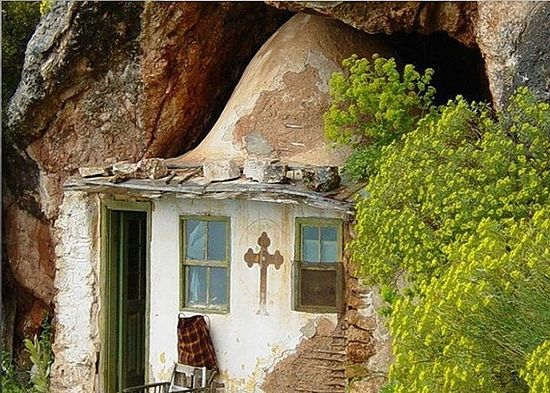 Elder`s cell. Photo: sophia-ntrekou.gr
Elder`s cell. Photo: sophia-ntrekou.gr
Advice on Carnal Warfare
When I [Elder Ephraim] first went to Elder Joseph, I had carnal thoughts and warfare. By the grace of God, when I was in the world I did not have any carnal experiences. I had been on the path of piety ever since I was young with an ascetical mother and an Athonite spiritual father. As a child I kept the fasts and said my prayers. I was completely chaste. But even so, the devil fought against me right from the beginning of my time with Elder Joseph. So I confessed the warfare to him, and asked him what I should do. He replied:
“What should you do? Strike the fantasy. And when the devil’s attacks intensify, take a cane and hit yourself. Sacrifice your body so that your soul can live. Carnal thoughts and warfare are confronted with the cane, which you should keep under your pillow. If you don’t face this beast in this manner tooth and nail, the flesh does not submit to the spirit. In this way does a person gradually acquire the flower and the fragrance of chastity and purity—things that have great boldness before God.”
“Oh,” I replied. “So that’s how this warfare is.”
I began fighting back. Whenever I encountered great difficulty with carnal thoughts, I gave myself a good beating. I had a cane under my pillow as Geronda had told me so that I would be ready when thoughts came in my sleep or when I was lying down. After resisting the thoughts for a while like this, a fragrance started coming out of my blankets. It was a spiritual fragrance—not like the perfumes of this world but something otherworldly. What was it from? It was a result of the purity that came about by resisting the thoughts. God didn’t pay attention to the thoughts but saw the struggle and rewarded it by sending a heavenly fragrance that filled my soul. This became a lesson for me that confirmed what Geronda taught. Then I said to myself, “How beautiful this warfare is!”
This is how we learned from Elder Joseph that temptations require forcefulness and resistance in order for the passion to abate. For he who battles us is a demon, a being that has only a specific amount of strength with which God has allowed him to fight us. As soon as this limit is reached, he will most certainly yield. And then what happens? The struggler is crowned, and victory is his!
Thoughts had to come; we had to do battle just as every struggling soul does. We had warfare, sometimes with this passion and sometimes with another. It was good for us. When the warfare ceased, and we had peace for a few days, we could see that we then lacked the spiritual elevation we had had when the battles and resistance lifted us up.
When I was suffering great temptations, Geronda said to me: “You are undergoing the warfare that only older, spiritually mature people have. For you to have such temptations means either that this experience and toil will be useful for you in the future or that a significant amount of God’s grace will visit you.” But since I was surrounded by the mist of the thoughts of those temptations, I thought I was losing the battle, and I couldn’t grasp then that those wise words of his were prophetic. His words were few but they were solid gold.
Chastity
Purity is not acquired by playing around, Geronda taught us. Chastity does not come to man without a bloody struggle with the thoughts. Even if a monk has not had any carnal fall in the world, the demon of fornication will still wage a real war against him, and even more so, naturally, if he has had a sinful past.
The demons start the warfare in the imagination; they cultivate it with thoughts; they defile the nous; they take it down into the heart; and they make both the soul and the body filthy. What decides a person’s entire progress or failure is whether he gives in to or resists the attacks of the imagination. If he makes the mistake of beginning a dialogue with the sinful assault and accepting the devil’s garbage by his own consent, what will follow are falls of the soul, mind, heart, and body. As a result, the passion will take him captive.
Our holy elder emphasized to us that when a monk falls into a carnal sin, it takes a great struggle afterwards to escape from it. If he does not win that bloody fight, God will give him other labors for the rest of his life. This is why young people must make an effort to struggle, resist, and repulse this demon. In this way will the victory of chastity arise, which will play an important role in both the present and future life—for no one unclean will dwell in God’s resplendent paradise.
He also explained to us that chastity is assisted by working at noetic prayer, toiling to keep vigil, punctually keeping one’s prayer rule, being watchful over one’s imagination and rational mind, and always using caution. Genuine and sincere obedience, frank confession, tears, repentance, maintaining the correct attitude of a disciple towards his elder, and abstinence in general are all aids, medicines, and means that help monks—but also every Christian—to acquire chastity as well as power in prayer.
Facing Carnal Warfare
One day a monk passed by and mentioned to Elder Joseph that he had intense carnal warfare. Geronda told him to stop drinking wine, to fast, to “tighten his belt,” to drive away filthy fantasies, and to use a cane, and then he could be sure that the warfare would subside. A little while later that same monk returned and said that he had followed his instructions, but the warfare still continued. Then Geronda took a cane and said to him: “Take this cane and hit yourself so that I can see how hard you hit.”
So he took the cane and hit himself so lightly that he was in essence just tapping himself. Then Geronda took the cane, lifted up his own cassock, and started hitting his leg so hard that the cane broke after the third hit! The monk said in awe: “Geronda, is that how we’re supposed to hit ourselves?”
“My child, this is how the demons are cast out—not with tapping!”
Moreover, Geronda told me the following significant teaching: “My child, carnal warfare is not set aflame so much by excessive eating, drinking, wine, and sleep, as it is by judging others.”
“Why, Geronda?”
“So that we learn that we all have the same nature, the same devil fights us, and that we are all liable of being judged. Would you like to hear something even more amazing?
“What, Geronda?”
“A person who does not judge his neighbor gives evidence that he is saved. Whoever does not judge will not be judged, as the Word of God verifies: ‘Judge not, that ye be not judged.’”
That is why he told us: “Has a judgmental thought about someone come to you? Don’t just sit there, debating with yourself whether that person is to blame or not. Justify everyone and take all the blame yourself. As soon as you start having negative thoughts about someone else, there is a danger that you will judge him. Just interrupt the thoughts and say to yourself: ‘What he is saying and doing is right. My ego is making me think evil about my brother, and so there’s no point trying to analyze it.’ If you don’t face the assaults of judgmental thoughts in this manner, whether you express them outwardly or cultivate them within you, you will have carnal warfare. And if you still don’t come to your senses then, then grace will abandon you, and you will fall. And if you do not repent after your fall and continue to judge others, your falls will have very serious consequences.”
For this reason, he taught us that no matter which passion fights a monk, he must confront it right from the beginning until it is annihilated. Even the slightest concession can lead to perdition. Indeed, there are some heroic souls with so much love and desire for God that when they perceive that unclean pleasure is attempting to subjugate their freedom and darken their nous, they try to drive away the pleasure through pain in order to keep themselves pure and clean in God’s eyes. This is a hard saying, but a soul that has tasted the ineffable love of God cannot allow itself any slip into sin. That is what my elder was like. As a layman, he was young, brave, and determined to fight to the end. There was no room for mediocrity. He forced himself, he exerted himself, and he displayed utter patience. With such good intentions, how could the grace of God not help him and elevate him to the lofty state that he reached?
The Power of Prayer
One day shortly before a major feast day of the Church, PapaNikiphoros said to his disciple, PapaEphraim, “You’re not going to Elder Joseph for the feast day.” When PapaEphraim sent word to us that he would not be coming, I was disappointed. Geronda saw that I was disappointed and asked me, “Koutsiko, would you like Papa to come?” I nodded. A little while later, Geronda said to me, “Papa will come after all.”
Indeed, PapaEphraim did show up for the feast day. He told us that all of a sudden, Papa-Nikiphoros changed his mind and told him, “Oh, just go!” Geronda’s prayers made him change his mind!
Expressing Respect
Out of Geronda’s sense of asceticism and self-denial, he told us that he didn’t want us to give him special treatment. As his disciples, however, we owed him respect, honor, and love. I said to myself, “Even though he himself is not requesting special treatment, that doesn’t mean I can’t express my respect for him.” So I would secretly take his and GeroArsenios’s filthy napkins, wash them, and then put them back in their places. When Geronda saw that his previously filthy, hard napkin was nice and soft, he was pleased. He didn’t really care so much about the napkin itself, but he was delighted because he could see behind it the respect and love of his spiritual child.
“Arsenios,” he said. “Look; they washed our napkins for us. See how soft they are?” He could see my love and knew how to appreciate it, so he didn’t blame me for washing them
When we are conscientiously living a spiritual life and the grace of God visits us, we believe that our spiritual father is an icon of God, and we feel that we owe him respect, love, and obedience. It was only natural to have such feelings for him who—second to God—was my savior and took care of my spiritual formation. It says in the Bible: Honour thy father and thy mother that it may be well with you, and: He that curseth his father or his mother shall surely be put to death. If in the Old Testament—which is merely the shadow of the law of the New Testament—God commanded children to honor their parents for bringing them into life, how much more so does this commandment apply to one’s spiritual father. If honoring one’s parents in the flesh brings so many blessings, how much more so does honoring one’s spiritual father. This is why St. Ephraim the Syrian warns: “Do not listen to someone insulting your spiritual father. Flee from him, lest the wrath of God come upon you.” The holy monastic Fathers held this matter in high regard. [Examples of this teaching may also be found in the writings of Saints Basil the Great, John of Sinai, Symeon the New Theologian, and Kallistos and Ignatios Xanthopoulos.]
Living Conditions
One day a priest came from the world to visit Geronda. Since we had nowhere to put him up for the night, Geronda gave him my cell, and I stayed outside. When he woke up in the middle of the night and stepped outside, I asked him, “How are you doing? Did you rest well?”
“My goodness! How do you live here? I’m terrified.”
“What are you afraid of?”
“This place is deserted.”
“It’s just fine. It’s very pleasant like that.”
“What’s going on here?”
“Don’t worry. We’re outside keeping vigil. Go back to sleep. We’re on guard.”
The next morning when he saw the gigantic boulder hanging above my cell, he asked, “How do you live under here? What if something happens and the boulder falls? Aren’t you afraid that it will crush you?”
“No. It won’t fall.”
“But if it does?”
“But it won’t! If God wants it to fall, it will fall and God will protect us.”
“But what if it falls when you’re underneath?”
“It won’t fall then; God will hold it up.”
It was as if we were speaking different languages and couldn’t understand each other. He was evaluating things merely with logic, whereas Geronda had taught us to see things with faith.
Even other monks were shocked at our living conditions. Once Fr. David from the Great Lavra came to meet Elder Joseph. He was a gigantic fellow. Geronda offered him my cell for the night. But when he saw it, he was startled and said, “Whoa! How do you survive in there?”
“What do you mean, GeroDavid?” I asked.
“Life is really tough here. How do you manage?”
“For us it’s Paradise. There’s no telling the joy we feel. I wouldn’t give it up for anything.”
“Well, I give up! I’m heading back to my monastery.”
The next time I saw him, he was still in awe and asked me again, “How do you live in that place? After all, we’re both monks.”
“It’s the grace of God that supports us,” I replied. “If it didn’t support us, we wouldn’t be able to live here either.”
We were at a wonderful age, and everything increased our zeal—the environment, the schedule, and the example set by GeroArsenios and especially by Geronda.

